Analyzing Advanced Financial Accounting: Framework & Objectives
VerifiedAdded on 2023/06/05
|10
|2175
|306
Report
AI Summary
This report delves into various aspects of advanced financial accounting, starting with the factors to consider when selecting a measurement basis, including relevance, cost-benefit justification, and minimizing unnecessary changes. It discusses the segregation of expenses and income in other comprehensive income (OCI) as per IAS 1 amendments, differentiating between items re-classifiable to profit or loss and those that are not. The report also explains the de-recognition of assets and liabilities from financial statements. Furthermore, it emphasizes the importance of assessing stewardship for achieving financial reporting objectives, highlighting management's responsibility for protecting economic resources and complying with regulations. Finally, the report discusses the necessity of revising the conceptual framework to improve the consistency and clarity of IFRSs, addressing issues related to the definitions of liabilities and assets, measurement bases, and disclosure requirements. Desklib offers a wealth of resources, including past papers and solved assignments, to aid students in mastering these complex concepts.
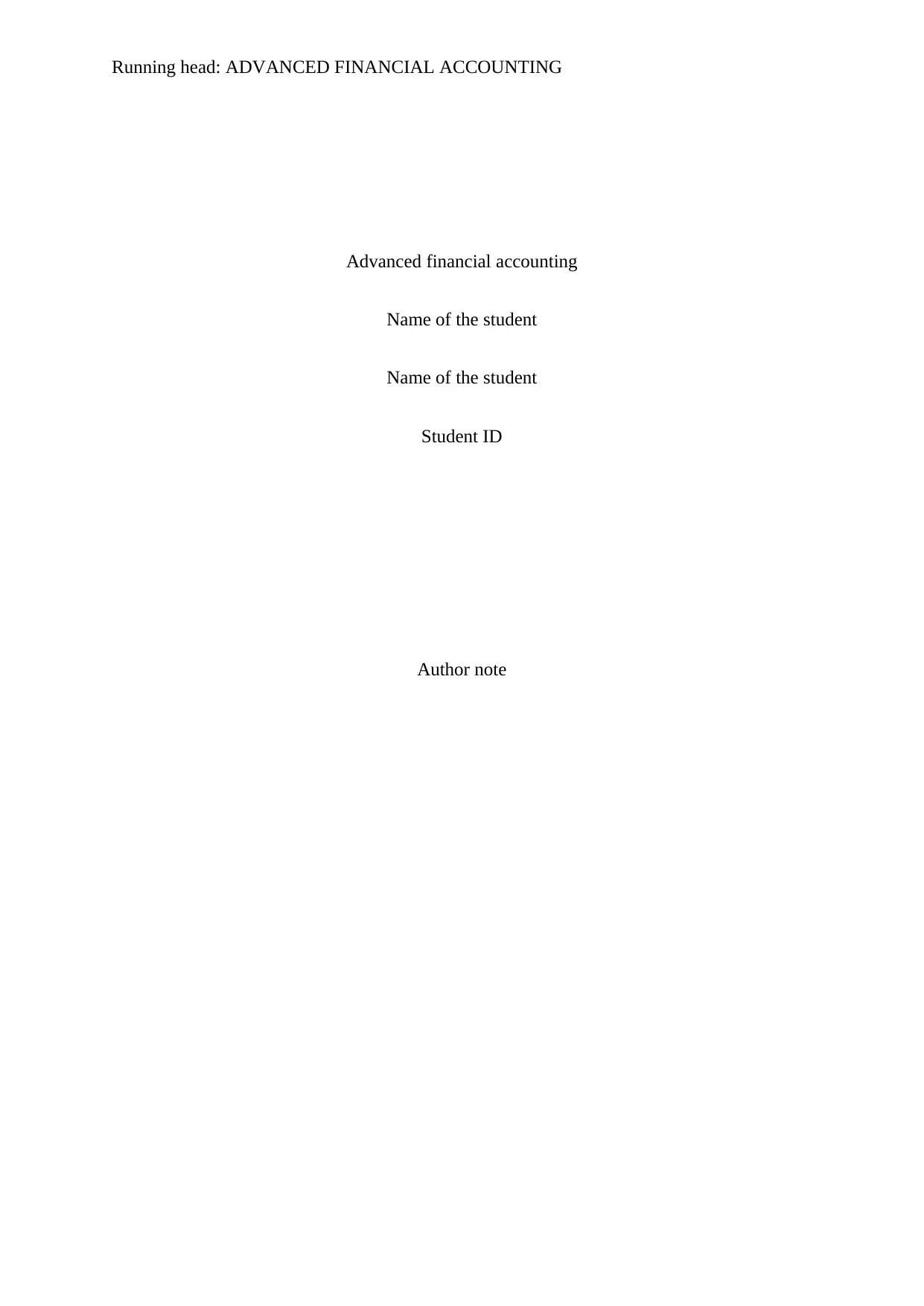
Running head: ADVANCED FINANCIAL ACCOUNTING
Advanced financial accounting
Name of the student
Name of the student
Student ID
Author note
Advanced financial accounting
Name of the student
Name of the student
Student ID
Author note
Paraphrase This Document
Need a fresh take? Get an instant paraphrase of this document with our AI Paraphraser
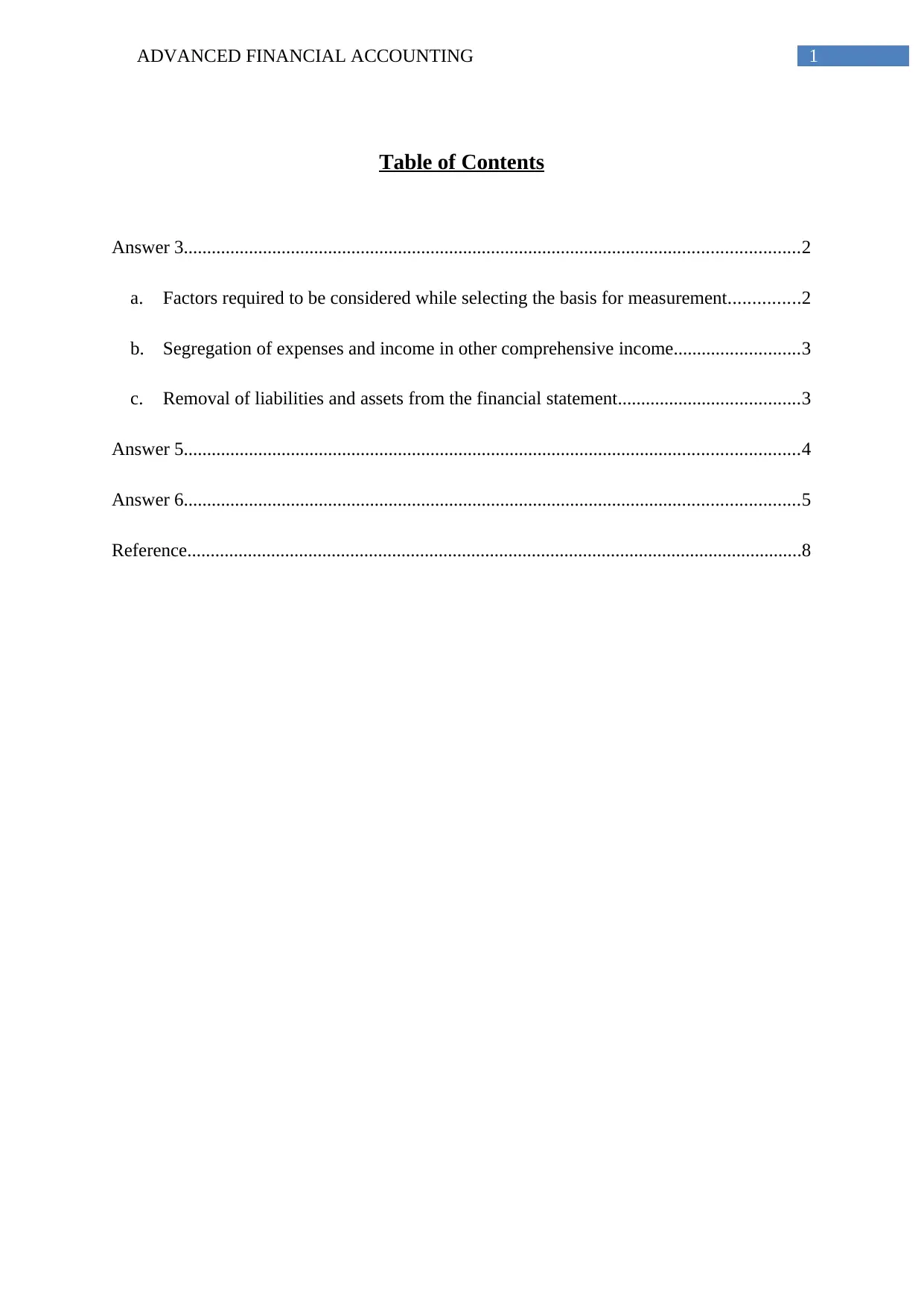
1ADVANCED FINANCIAL ACCOUNTING
Table of Contents
Answer 3....................................................................................................................................2
a. Factors required to be considered while selecting the basis for measurement...............2
b. Segregation of expenses and income in other comprehensive income...........................3
c. Removal of liabilities and assets from the financial statement.......................................3
Answer 5....................................................................................................................................4
Answer 6....................................................................................................................................5
Reference....................................................................................................................................8
Table of Contents
Answer 3....................................................................................................................................2
a. Factors required to be considered while selecting the basis for measurement...............2
b. Segregation of expenses and income in other comprehensive income...........................3
c. Removal of liabilities and assets from the financial statement.......................................3
Answer 5....................................................................................................................................4
Answer 6....................................................................................................................................5
Reference....................................................................................................................................8
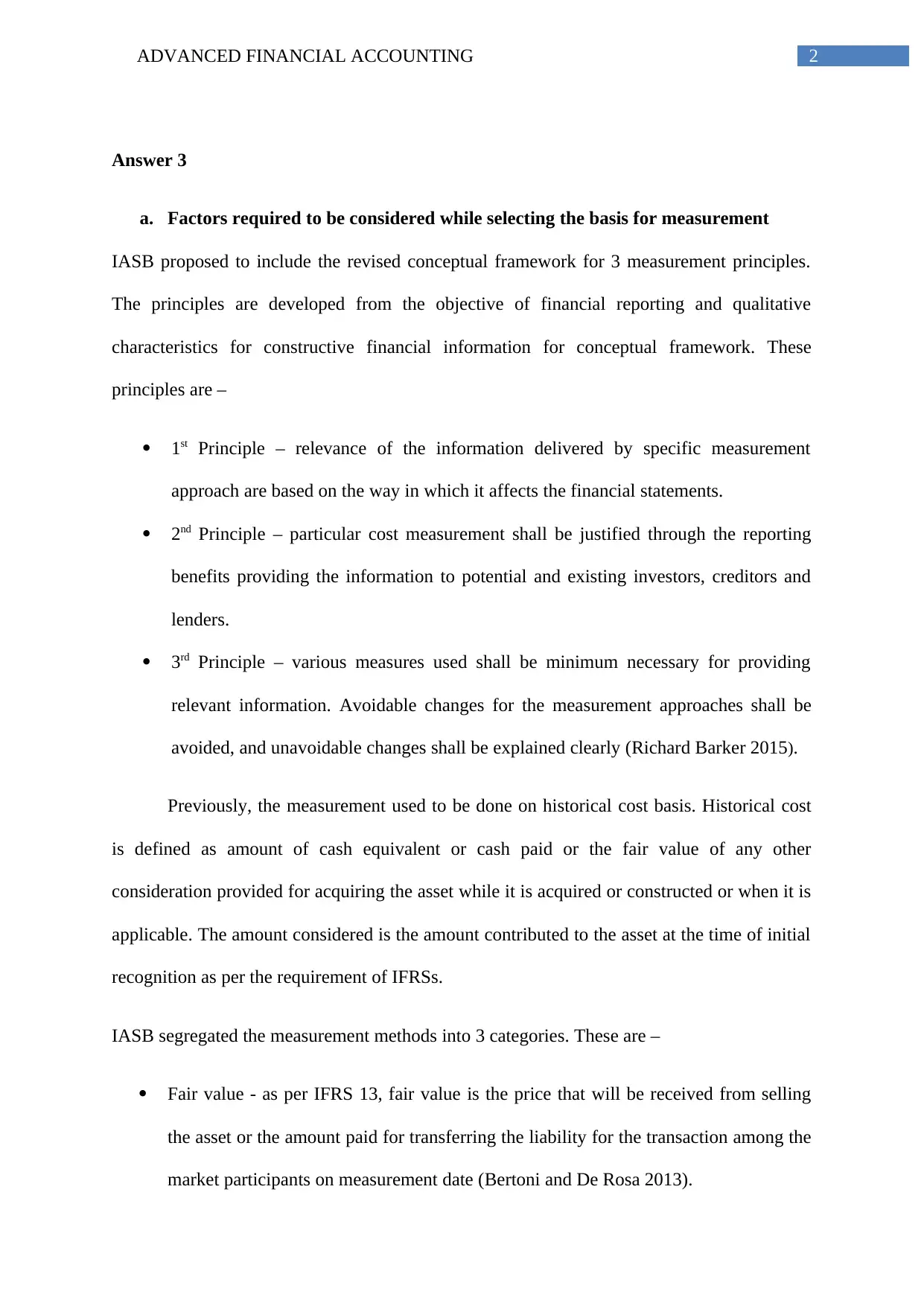
2ADVANCED FINANCIAL ACCOUNTING
Answer 3
a. Factors required to be considered while selecting the basis for measurement
IASB proposed to include the revised conceptual framework for 3 measurement principles.
The principles are developed from the objective of financial reporting and qualitative
characteristics for constructive financial information for conceptual framework. These
principles are –
1st Principle – relevance of the information delivered by specific measurement
approach are based on the way in which it affects the financial statements.
2nd Principle – particular cost measurement shall be justified through the reporting
benefits providing the information to potential and existing investors, creditors and
lenders.
3rd Principle – various measures used shall be minimum necessary for providing
relevant information. Avoidable changes for the measurement approaches shall be
avoided, and unavoidable changes shall be explained clearly (Richard Barker 2015).
Previously, the measurement used to be done on historical cost basis. Historical cost
is defined as amount of cash equivalent or cash paid or the fair value of any other
consideration provided for acquiring the asset while it is acquired or constructed or when it is
applicable. The amount considered is the amount contributed to the asset at the time of initial
recognition as per the requirement of IFRSs.
IASB segregated the measurement methods into 3 categories. These are –
Fair value - as per IFRS 13, fair value is the price that will be received from selling
the asset or the amount paid for transferring the liability for the transaction among the
market participants on measurement date (Bertoni and De Rosa 2013).
Answer 3
a. Factors required to be considered while selecting the basis for measurement
IASB proposed to include the revised conceptual framework for 3 measurement principles.
The principles are developed from the objective of financial reporting and qualitative
characteristics for constructive financial information for conceptual framework. These
principles are –
1st Principle – relevance of the information delivered by specific measurement
approach are based on the way in which it affects the financial statements.
2nd Principle – particular cost measurement shall be justified through the reporting
benefits providing the information to potential and existing investors, creditors and
lenders.
3rd Principle – various measures used shall be minimum necessary for providing
relevant information. Avoidable changes for the measurement approaches shall be
avoided, and unavoidable changes shall be explained clearly (Richard Barker 2015).
Previously, the measurement used to be done on historical cost basis. Historical cost
is defined as amount of cash equivalent or cash paid or the fair value of any other
consideration provided for acquiring the asset while it is acquired or constructed or when it is
applicable. The amount considered is the amount contributed to the asset at the time of initial
recognition as per the requirement of IFRSs.
IASB segregated the measurement methods into 3 categories. These are –
Fair value - as per IFRS 13, fair value is the price that will be received from selling
the asset or the amount paid for transferring the liability for the transaction among the
market participants on measurement date (Bertoni and De Rosa 2013).
⊘ This is a preview!⊘
Do you want full access?
Subscribe today to unlock all pages.

Trusted by 1+ million students worldwide
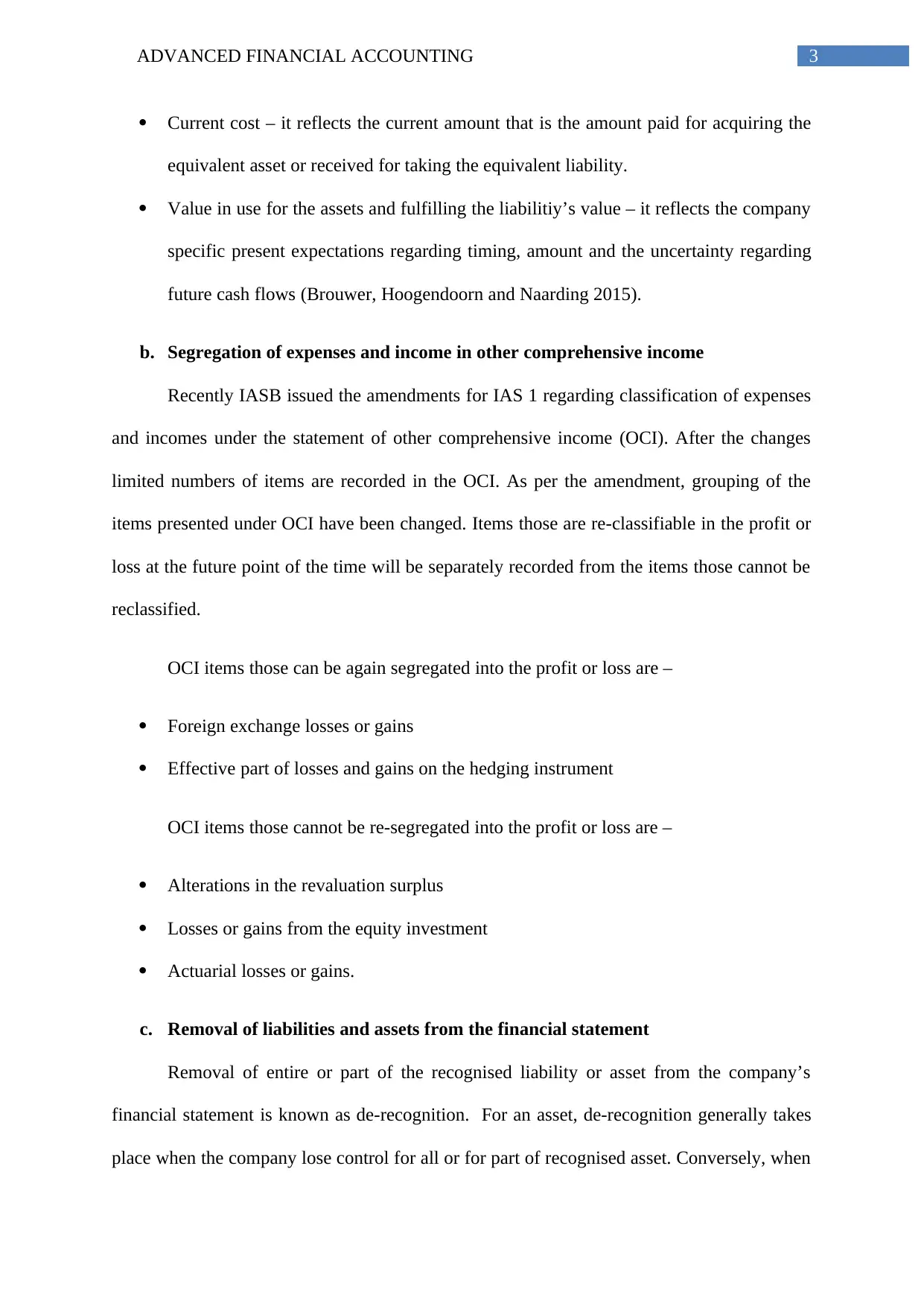
3ADVANCED FINANCIAL ACCOUNTING
Current cost – it reflects the current amount that is the amount paid for acquiring the
equivalent asset or received for taking the equivalent liability.
Value in use for the assets and fulfilling the liabilitiy’s value – it reflects the company
specific present expectations regarding timing, amount and the uncertainty regarding
future cash flows (Brouwer, Hoogendoorn and Naarding 2015).
b. Segregation of expenses and income in other comprehensive income
Recently IASB issued the amendments for IAS 1 regarding classification of expenses
and incomes under the statement of other comprehensive income (OCI). After the changes
limited numbers of items are recorded in the OCI. As per the amendment, grouping of the
items presented under OCI have been changed. Items those are re-classifiable in the profit or
loss at the future point of the time will be separately recorded from the items those cannot be
reclassified.
OCI items those can be again segregated into the profit or loss are –
Foreign exchange losses or gains
Effective part of losses and gains on the hedging instrument
OCI items those cannot be re-segregated into the profit or loss are –
Alterations in the revaluation surplus
Losses or gains from the equity investment
Actuarial losses or gains.
c. Removal of liabilities and assets from the financial statement
Removal of entire or part of the recognised liability or asset from the company’s
financial statement is known as de-recognition. For an asset, de-recognition generally takes
place when the company lose control for all or for part of recognised asset. Conversely, when
Current cost – it reflects the current amount that is the amount paid for acquiring the
equivalent asset or received for taking the equivalent liability.
Value in use for the assets and fulfilling the liabilitiy’s value – it reflects the company
specific present expectations regarding timing, amount and the uncertainty regarding
future cash flows (Brouwer, Hoogendoorn and Naarding 2015).
b. Segregation of expenses and income in other comprehensive income
Recently IASB issued the amendments for IAS 1 regarding classification of expenses
and incomes under the statement of other comprehensive income (OCI). After the changes
limited numbers of items are recorded in the OCI. As per the amendment, grouping of the
items presented under OCI have been changed. Items those are re-classifiable in the profit or
loss at the future point of the time will be separately recorded from the items those cannot be
reclassified.
OCI items those can be again segregated into the profit or loss are –
Foreign exchange losses or gains
Effective part of losses and gains on the hedging instrument
OCI items those cannot be re-segregated into the profit or loss are –
Alterations in the revaluation surplus
Losses or gains from the equity investment
Actuarial losses or gains.
c. Removal of liabilities and assets from the financial statement
Removal of entire or part of the recognised liability or asset from the company’s
financial statement is known as de-recognition. For an asset, de-recognition generally takes
place when the company lose control for all or for part of recognised asset. Conversely, when
Paraphrase This Document
Need a fresh take? Get an instant paraphrase of this document with our AI Paraphraser
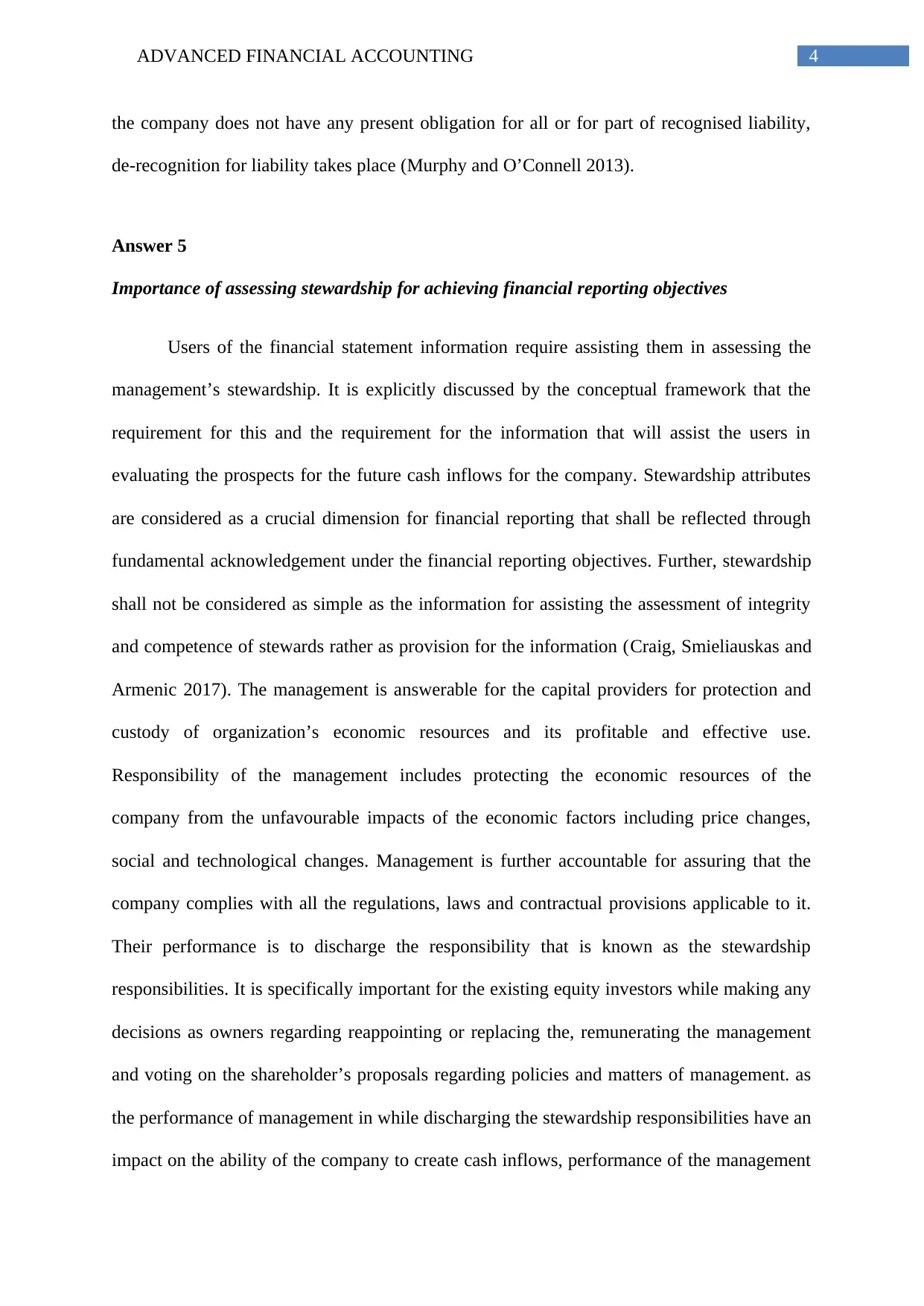
4ADVANCED FINANCIAL ACCOUNTING
the company does not have any present obligation for all or for part of recognised liability,
de-recognition for liability takes place (Murphy and O’Connell 2013).
Answer 5
Importance of assessing stewardship for achieving financial reporting objectives
Users of the financial statement information require assisting them in assessing the
management’s stewardship. It is explicitly discussed by the conceptual framework that the
requirement for this and the requirement for the information that will assist the users in
evaluating the prospects for the future cash inflows for the company. Stewardship attributes
are considered as a crucial dimension for financial reporting that shall be reflected through
fundamental acknowledgement under the financial reporting objectives. Further, stewardship
shall not be considered as simple as the information for assisting the assessment of integrity
and competence of stewards rather as provision for the information (Craig, Smieliauskas and
Armenic 2017). The management is answerable for the capital providers for protection and
custody of organization’s economic resources and its profitable and effective use.
Responsibility of the management includes protecting the economic resources of the
company from the unfavourable impacts of the economic factors including price changes,
social and technological changes. Management is further accountable for assuring that the
company complies with all the regulations, laws and contractual provisions applicable to it.
Their performance is to discharge the responsibility that is known as the stewardship
responsibilities. It is specifically important for the existing equity investors while making any
decisions as owners regarding reappointing or replacing the, remunerating the management
and voting on the shareholder’s proposals regarding policies and matters of management. as
the performance of management in while discharging the stewardship responsibilities have an
impact on the ability of the company to create cash inflows, performance of the management
the company does not have any present obligation for all or for part of recognised liability,
de-recognition for liability takes place (Murphy and O’Connell 2013).
Answer 5
Importance of assessing stewardship for achieving financial reporting objectives
Users of the financial statement information require assisting them in assessing the
management’s stewardship. It is explicitly discussed by the conceptual framework that the
requirement for this and the requirement for the information that will assist the users in
evaluating the prospects for the future cash inflows for the company. Stewardship attributes
are considered as a crucial dimension for financial reporting that shall be reflected through
fundamental acknowledgement under the financial reporting objectives. Further, stewardship
shall not be considered as simple as the information for assisting the assessment of integrity
and competence of stewards rather as provision for the information (Craig, Smieliauskas and
Armenic 2017). The management is answerable for the capital providers for protection and
custody of organization’s economic resources and its profitable and effective use.
Responsibility of the management includes protecting the economic resources of the
company from the unfavourable impacts of the economic factors including price changes,
social and technological changes. Management is further accountable for assuring that the
company complies with all the regulations, laws and contractual provisions applicable to it.
Their performance is to discharge the responsibility that is known as the stewardship
responsibilities. It is specifically important for the existing equity investors while making any
decisions as owners regarding reappointing or replacing the, remunerating the management
and voting on the shareholder’s proposals regarding policies and matters of management. as
the performance of management in while discharging the stewardship responsibilities have an
impact on the ability of the company to create cash inflows, performance of the management
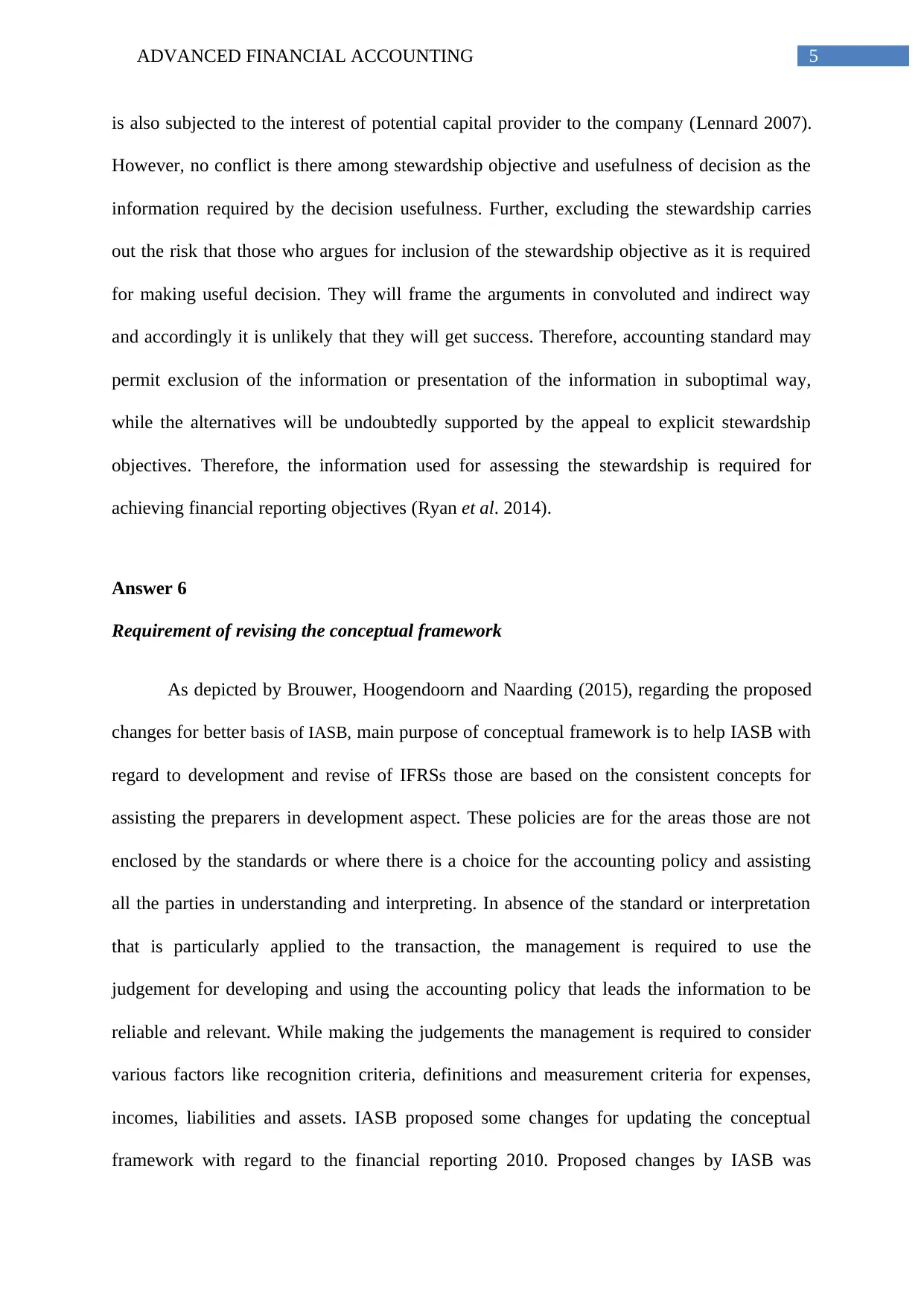
5ADVANCED FINANCIAL ACCOUNTING
is also subjected to the interest of potential capital provider to the company (Lennard 2007).
However, no conflict is there among stewardship objective and usefulness of decision as the
information required by the decision usefulness. Further, excluding the stewardship carries
out the risk that those who argues for inclusion of the stewardship objective as it is required
for making useful decision. They will frame the arguments in convoluted and indirect way
and accordingly it is unlikely that they will get success. Therefore, accounting standard may
permit exclusion of the information or presentation of the information in suboptimal way,
while the alternatives will be undoubtedly supported by the appeal to explicit stewardship
objectives. Therefore, the information used for assessing the stewardship is required for
achieving financial reporting objectives (Ryan et al. 2014).
Answer 6
Requirement of revising the conceptual framework
As depicted by Brouwer, Hoogendoorn and Naarding (2015), regarding the proposed
changes for better basis of IASB, main purpose of conceptual framework is to help IASB with
regard to development and revise of IFRSs those are based on the consistent concepts for
assisting the preparers in development aspect. These policies are for the areas those are not
enclosed by the standards or where there is a choice for the accounting policy and assisting
all the parties in understanding and interpreting. In absence of the standard or interpretation
that is particularly applied to the transaction, the management is required to use the
judgement for developing and using the accounting policy that leads the information to be
reliable and relevant. While making the judgements the management is required to consider
various factors like recognition criteria, definitions and measurement criteria for expenses,
incomes, liabilities and assets. IASB proposed some changes for updating the conceptual
framework with regard to the financial reporting 2010. Proposed changes by IASB was
is also subjected to the interest of potential capital provider to the company (Lennard 2007).
However, no conflict is there among stewardship objective and usefulness of decision as the
information required by the decision usefulness. Further, excluding the stewardship carries
out the risk that those who argues for inclusion of the stewardship objective as it is required
for making useful decision. They will frame the arguments in convoluted and indirect way
and accordingly it is unlikely that they will get success. Therefore, accounting standard may
permit exclusion of the information or presentation of the information in suboptimal way,
while the alternatives will be undoubtedly supported by the appeal to explicit stewardship
objectives. Therefore, the information used for assessing the stewardship is required for
achieving financial reporting objectives (Ryan et al. 2014).
Answer 6
Requirement of revising the conceptual framework
As depicted by Brouwer, Hoogendoorn and Naarding (2015), regarding the proposed
changes for better basis of IASB, main purpose of conceptual framework is to help IASB with
regard to development and revise of IFRSs those are based on the consistent concepts for
assisting the preparers in development aspect. These policies are for the areas those are not
enclosed by the standards or where there is a choice for the accounting policy and assisting
all the parties in understanding and interpreting. In absence of the standard or interpretation
that is particularly applied to the transaction, the management is required to use the
judgement for developing and using the accounting policy that leads the information to be
reliable and relevant. While making the judgements the management is required to consider
various factors like recognition criteria, definitions and measurement criteria for expenses,
incomes, liabilities and assets. IASB proposed some changes for updating the conceptual
framework with regard to the financial reporting 2010. Proposed changes by IASB was
⊘ This is a preview!⊘
Do you want full access?
Subscribe today to unlock all pages.

Trusted by 1+ million students worldwide
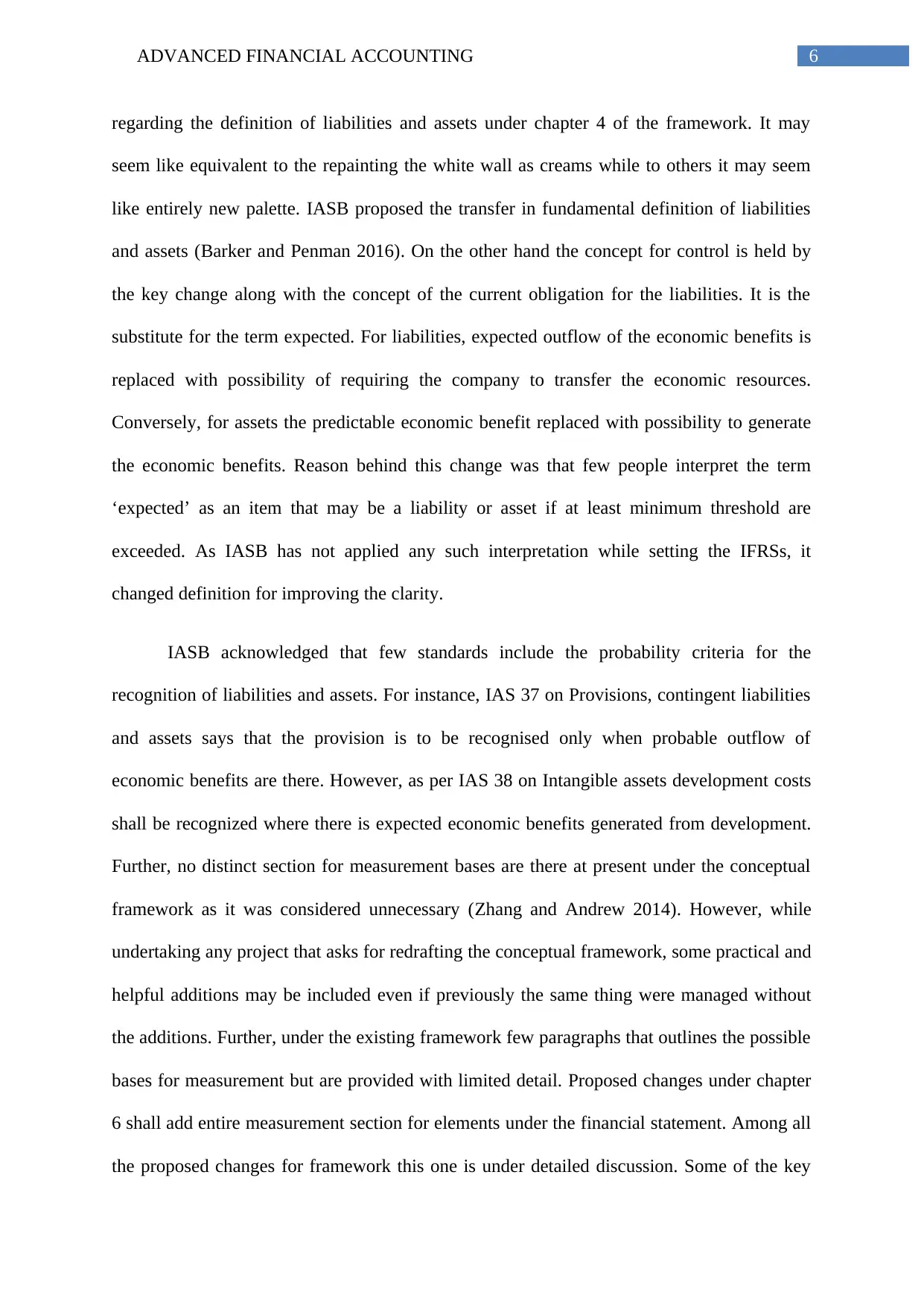
6ADVANCED FINANCIAL ACCOUNTING
regarding the definition of liabilities and assets under chapter 4 of the framework. It may
seem like equivalent to the repainting the white wall as creams while to others it may seem
like entirely new palette. IASB proposed the transfer in fundamental definition of liabilities
and assets (Barker and Penman 2016). On the other hand the concept for control is held by
the key change along with the concept of the current obligation for the liabilities. It is the
substitute for the term expected. For liabilities, expected outflow of the economic benefits is
replaced with possibility of requiring the company to transfer the economic resources.
Conversely, for assets the predictable economic benefit replaced with possibility to generate
the economic benefits. Reason behind this change was that few people interpret the term
‘expected’ as an item that may be a liability or asset if at least minimum threshold are
exceeded. As IASB has not applied any such interpretation while setting the IFRSs, it
changed definition for improving the clarity.
IASB acknowledged that few standards include the probability criteria for the
recognition of liabilities and assets. For instance, IAS 37 on Provisions, contingent liabilities
and assets says that the provision is to be recognised only when probable outflow of
economic benefits are there. However, as per IAS 38 on Intangible assets development costs
shall be recognized where there is expected economic benefits generated from development.
Further, no distinct section for measurement bases are there at present under the conceptual
framework as it was considered unnecessary (Zhang and Andrew 2014). However, while
undertaking any project that asks for redrafting the conceptual framework, some practical and
helpful additions may be included even if previously the same thing were managed without
the additions. Further, under the existing framework few paragraphs that outlines the possible
bases for measurement but are provided with limited detail. Proposed changes under chapter
6 shall add entire measurement section for elements under the financial statement. Among all
the proposed changes for framework this one is under detailed discussion. Some of the key
regarding the definition of liabilities and assets under chapter 4 of the framework. It may
seem like equivalent to the repainting the white wall as creams while to others it may seem
like entirely new palette. IASB proposed the transfer in fundamental definition of liabilities
and assets (Barker and Penman 2016). On the other hand the concept for control is held by
the key change along with the concept of the current obligation for the liabilities. It is the
substitute for the term expected. For liabilities, expected outflow of the economic benefits is
replaced with possibility of requiring the company to transfer the economic resources.
Conversely, for assets the predictable economic benefit replaced with possibility to generate
the economic benefits. Reason behind this change was that few people interpret the term
‘expected’ as an item that may be a liability or asset if at least minimum threshold are
exceeded. As IASB has not applied any such interpretation while setting the IFRSs, it
changed definition for improving the clarity.
IASB acknowledged that few standards include the probability criteria for the
recognition of liabilities and assets. For instance, IAS 37 on Provisions, contingent liabilities
and assets says that the provision is to be recognised only when probable outflow of
economic benefits are there. However, as per IAS 38 on Intangible assets development costs
shall be recognized where there is expected economic benefits generated from development.
Further, no distinct section for measurement bases are there at present under the conceptual
framework as it was considered unnecessary (Zhang and Andrew 2014). However, while
undertaking any project that asks for redrafting the conceptual framework, some practical and
helpful additions may be included even if previously the same thing were managed without
the additions. Further, under the existing framework few paragraphs that outlines the possible
bases for measurement but are provided with limited detail. Proposed changes under chapter
6 shall add entire measurement section for elements under the financial statement. Among all
the proposed changes for framework this one is under detailed discussion. Some of the key
Paraphrase This Document
Need a fresh take? Get an instant paraphrase of this document with our AI Paraphraser
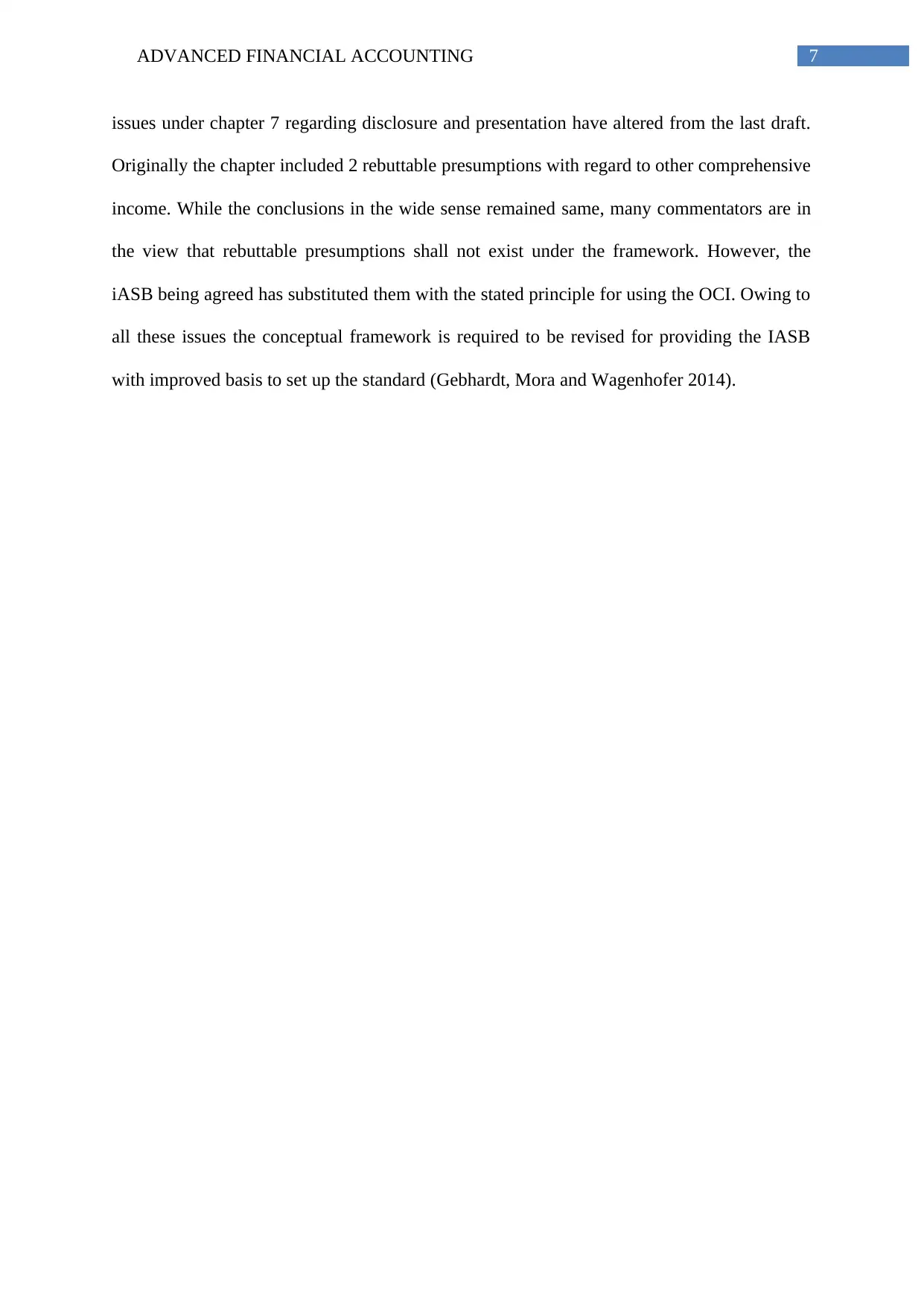
7ADVANCED FINANCIAL ACCOUNTING
issues under chapter 7 regarding disclosure and presentation have altered from the last draft.
Originally the chapter included 2 rebuttable presumptions with regard to other comprehensive
income. While the conclusions in the wide sense remained same, many commentators are in
the view that rebuttable presumptions shall not exist under the framework. However, the
iASB being agreed has substituted them with the stated principle for using the OCI. Owing to
all these issues the conceptual framework is required to be revised for providing the IASB
with improved basis to set up the standard (Gebhardt, Mora and Wagenhofer 2014).
issues under chapter 7 regarding disclosure and presentation have altered from the last draft.
Originally the chapter included 2 rebuttable presumptions with regard to other comprehensive
income. While the conclusions in the wide sense remained same, many commentators are in
the view that rebuttable presumptions shall not exist under the framework. However, the
iASB being agreed has substituted them with the stated principle for using the OCI. Owing to
all these issues the conceptual framework is required to be revised for providing the IASB
with improved basis to set up the standard (Gebhardt, Mora and Wagenhofer 2014).
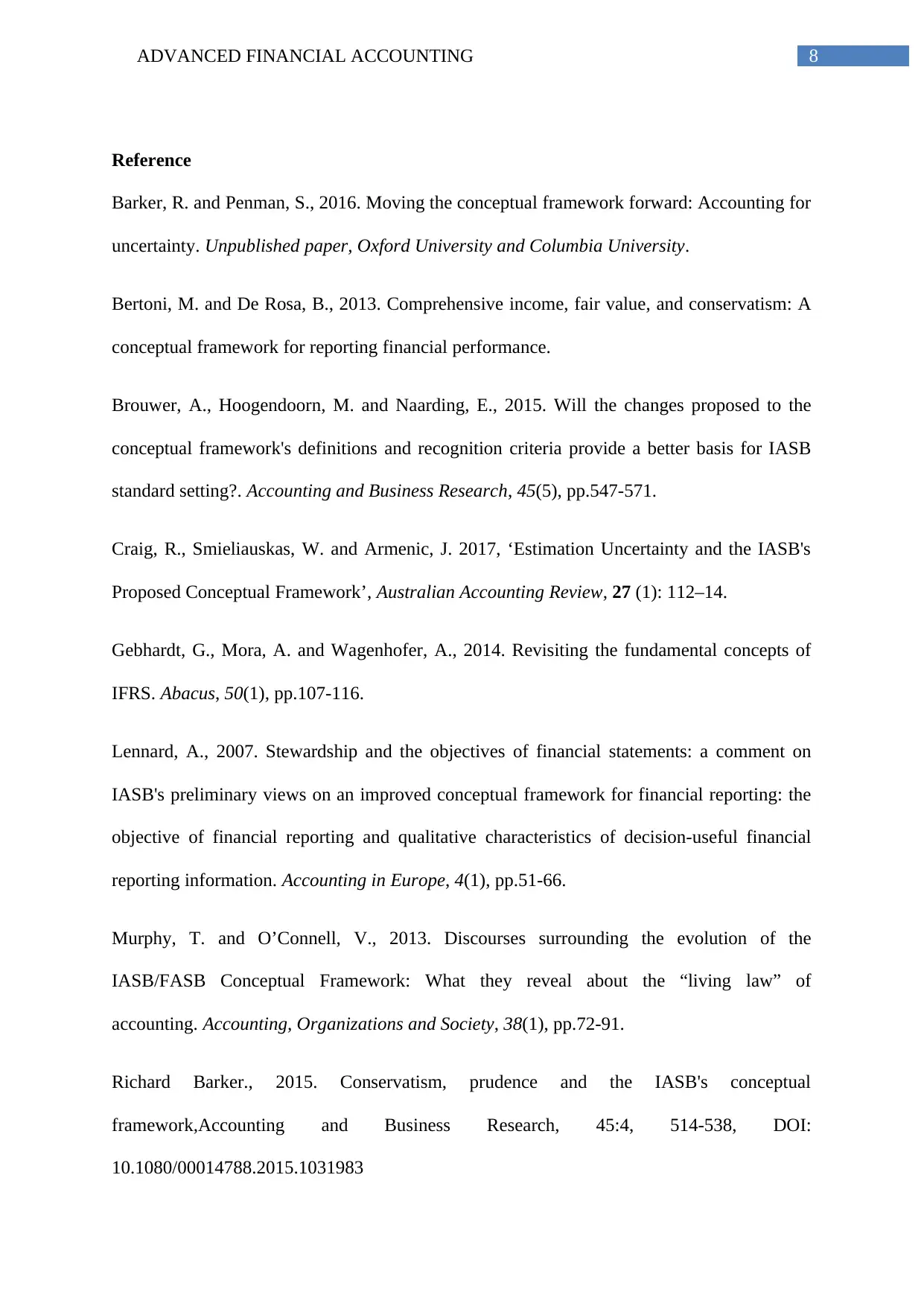
8ADVANCED FINANCIAL ACCOUNTING
Reference
Barker, R. and Penman, S., 2016. Moving the conceptual framework forward: Accounting for
uncertainty. Unpublished paper, Oxford University and Columbia University.
Bertoni, M. and De Rosa, B., 2013. Comprehensive income, fair value, and conservatism: A
conceptual framework for reporting financial performance.
Brouwer, A., Hoogendoorn, M. and Naarding, E., 2015. Will the changes proposed to the
conceptual framework's definitions and recognition criteria provide a better basis for IASB
standard setting?. Accounting and Business Research, 45(5), pp.547-571.
Craig, R., Smieliauskas, W. and Armenic, J. 2017, ‘Estimation Uncertainty and the IASB's
Proposed Conceptual Framework’, Australian Accounting Review, 27 (1): 112–14.
Gebhardt, G., Mora, A. and Wagenhofer, A., 2014. Revisiting the fundamental concepts of
IFRS. Abacus, 50(1), pp.107-116.
Lennard, A., 2007. Stewardship and the objectives of financial statements: a comment on
IASB's preliminary views on an improved conceptual framework for financial reporting: the
objective of financial reporting and qualitative characteristics of decision-useful financial
reporting information. Accounting in Europe, 4(1), pp.51-66.
Murphy, T. and O’Connell, V., 2013. Discourses surrounding the evolution of the
IASB/FASB Conceptual Framework: What they reveal about the “living law” of
accounting. Accounting, Organizations and Society, 38(1), pp.72-91.
Richard Barker., 2015. Conservatism, prudence and the IASB's conceptual
framework,Accounting and Business Research, 45:4, 514-538, DOI:
10.1080/00014788.2015.1031983
Reference
Barker, R. and Penman, S., 2016. Moving the conceptual framework forward: Accounting for
uncertainty. Unpublished paper, Oxford University and Columbia University.
Bertoni, M. and De Rosa, B., 2013. Comprehensive income, fair value, and conservatism: A
conceptual framework for reporting financial performance.
Brouwer, A., Hoogendoorn, M. and Naarding, E., 2015. Will the changes proposed to the
conceptual framework's definitions and recognition criteria provide a better basis for IASB
standard setting?. Accounting and Business Research, 45(5), pp.547-571.
Craig, R., Smieliauskas, W. and Armenic, J. 2017, ‘Estimation Uncertainty and the IASB's
Proposed Conceptual Framework’, Australian Accounting Review, 27 (1): 112–14.
Gebhardt, G., Mora, A. and Wagenhofer, A., 2014. Revisiting the fundamental concepts of
IFRS. Abacus, 50(1), pp.107-116.
Lennard, A., 2007. Stewardship and the objectives of financial statements: a comment on
IASB's preliminary views on an improved conceptual framework for financial reporting: the
objective of financial reporting and qualitative characteristics of decision-useful financial
reporting information. Accounting in Europe, 4(1), pp.51-66.
Murphy, T. and O’Connell, V., 2013. Discourses surrounding the evolution of the
IASB/FASB Conceptual Framework: What they reveal about the “living law” of
accounting. Accounting, Organizations and Society, 38(1), pp.72-91.
Richard Barker., 2015. Conservatism, prudence and the IASB's conceptual
framework,Accounting and Business Research, 45:4, 514-538, DOI:
10.1080/00014788.2015.1031983
⊘ This is a preview!⊘
Do you want full access?
Subscribe today to unlock all pages.

Trusted by 1+ million students worldwide
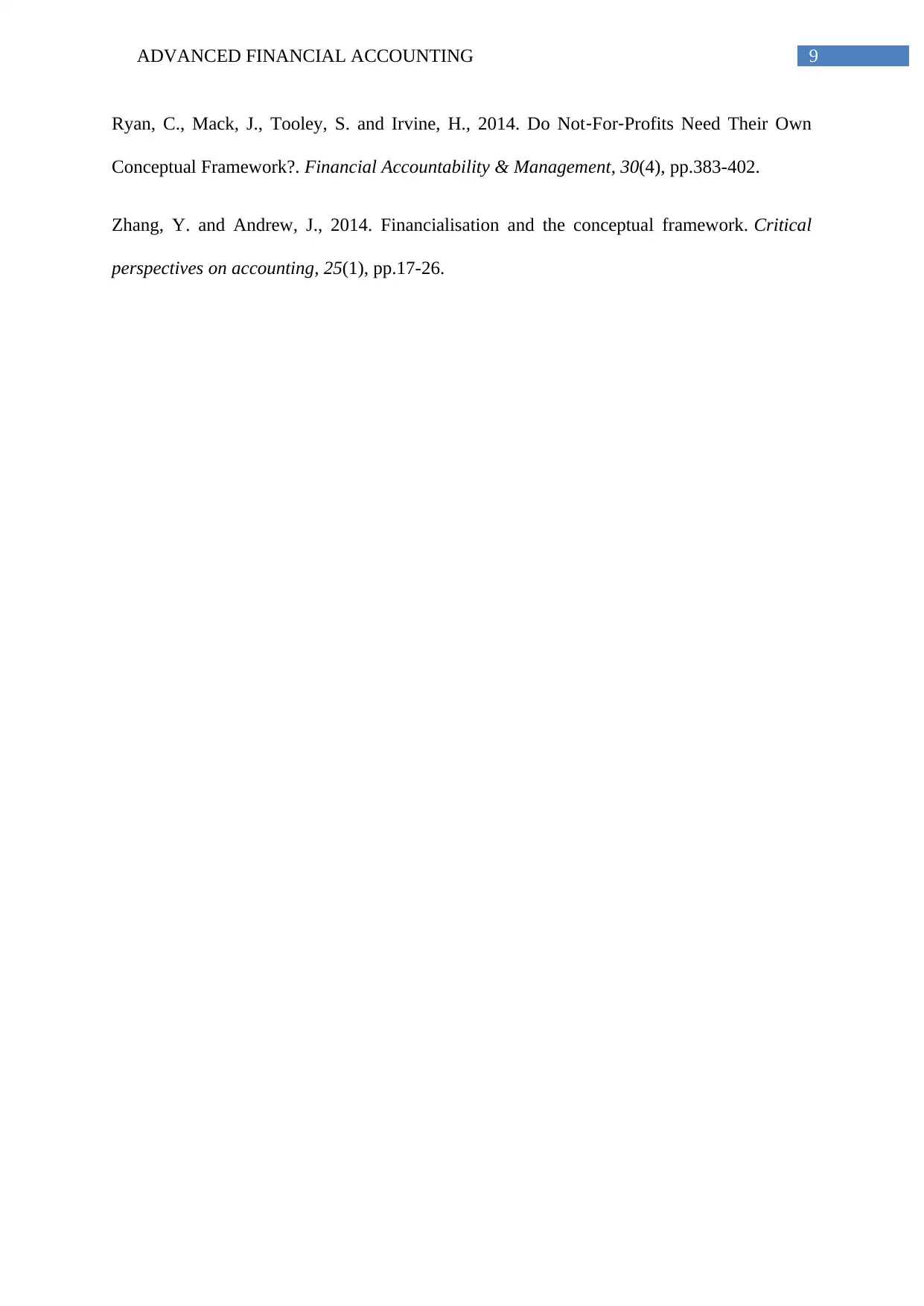
9ADVANCED FINANCIAL ACCOUNTING
Ryan, C., Mack, J., Tooley, S. and Irvine, H., 2014. Do Not‐For‐Profits Need Their Own
Conceptual Framework?. Financial Accountability & Management, 30(4), pp.383-402.
Zhang, Y. and Andrew, J., 2014. Financialisation and the conceptual framework. Critical
perspectives on accounting, 25(1), pp.17-26.
Ryan, C., Mack, J., Tooley, S. and Irvine, H., 2014. Do Not‐For‐Profits Need Their Own
Conceptual Framework?. Financial Accountability & Management, 30(4), pp.383-402.
Zhang, Y. and Andrew, J., 2014. Financialisation and the conceptual framework. Critical
perspectives on accounting, 25(1), pp.17-26.
1 out of 10
Related Documents
Your All-in-One AI-Powered Toolkit for Academic Success.
+13062052269
info@desklib.com
Available 24*7 on WhatsApp / Email
![[object Object]](/_next/static/media/star-bottom.7253800d.svg)
Unlock your academic potential
Copyright © 2020–2026 A2Z Services. All Rights Reserved. Developed and managed by ZUCOL.




